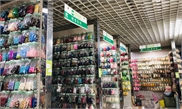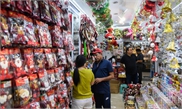SOURCE / INDUSTRIES
Coronavirus boosts online trade in Yiwu

Warehouse of Yiwu Bonded Logistics Center. (File photo)
While the outbreak of the novel coronavirus pneumonia (COVID-19) has hindered offline trade in Yiwu, the world's commodity capital in East China's Zhejiang Province, the virus has boosted online trade.
Analysts believe that online trade will become the main form of trade in Yiwu in the future.
Since the resumption of work and production on February 10, the daily volume of parcels imported in Yiwu has exceeded 45,000 items, an increase of 6.6 times that of last year, data from the Yiwu government showed on Thursday.
And Yiwu e-commerce has completed 1.1 million cross-border package deliveries as of Wednesday in the past 30 days.
"The outbreak of COVID-19 has had a big impact on our lives and our business models, possibly over the long term. The epidemic has boosted the development of online foreign trade and will become a new trend of trade in the future, especially in Yiwu, a pioneer of foreign trade," Zhou Xuezhi, a research fellow at the Chinese Academy of Social Sciences, told the Global Times on Thursday.
E-commerce has benefitted from support from the local government. According to a new policy released by the Yiwu Market Development Committee on Thursday, locally registered enterprises that import goods via cross-border e-commerce through bonded warehouses will be rewarded with 0.3 yuan ($0.04) for every $1 of goods sold.
"Peak season for cross-border e-commerce shipments comes after the Spring Festival, and we have a backlog of more than 110,000 orders on various e-commerce platforms," said a manager surnamed Zeng from Yiwu Xiangtong supply chain management Co.
"Thanks to the concerted efforts of all parties, we packed and delivered 110,000 cross-border parcels in 14 days, three days ahead of schedule. At present, the enterprise is actively preparing for the March 8 online shopping festival. It is expected that the orders will grow by around 200 percent," Zeng said.
March 8 is another online shopping carnival created by Chinese e-commerce platforms after the famous November 11 Single's Day shopping festival. Since March 8 is the international women's day, the festival is named "the goddess shopping festival."
Big data from Alibaba showed that the cumulative paid-in gross merchandise volume (GMV) increased 91 percent on a yearly basis in March, and the number of buyers increased 62.8 percent year-on-year.
Hong Tao, director of the Institute of Business Economics at Beijing Technology and Business University, told the Global Times that the entire economy in China is now going digital.
"The epidemic outbreak is different from that of SARS in 2003, as it brings impacts as well as opportunities for industries to make a change," said Hong.


